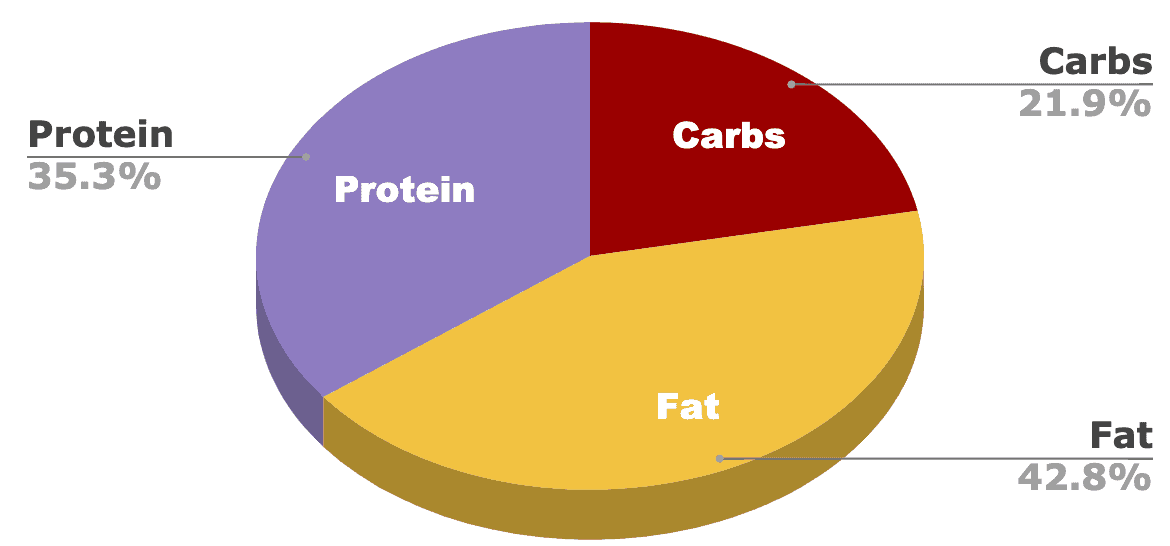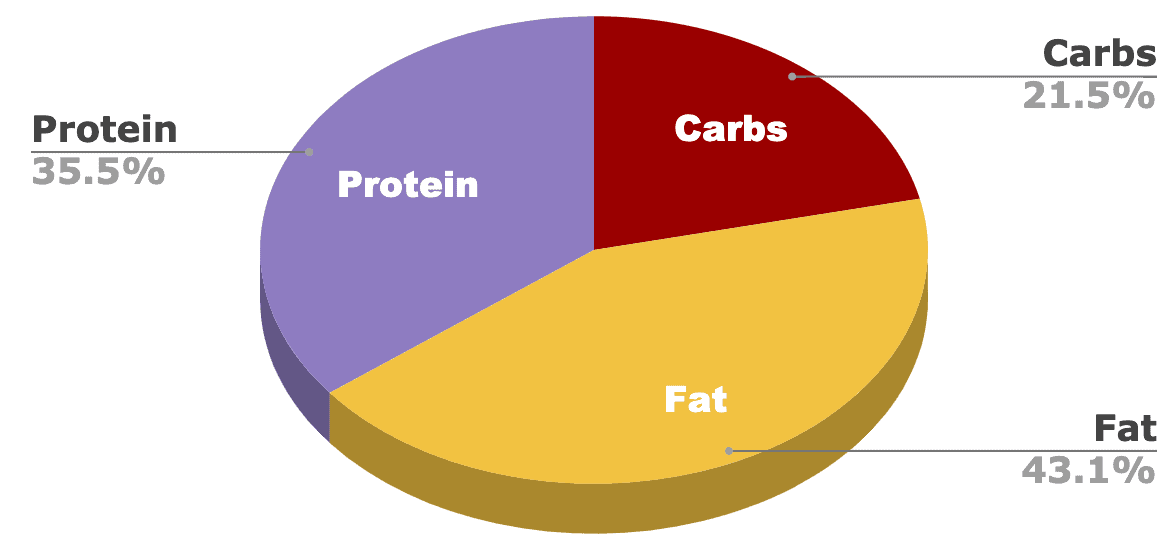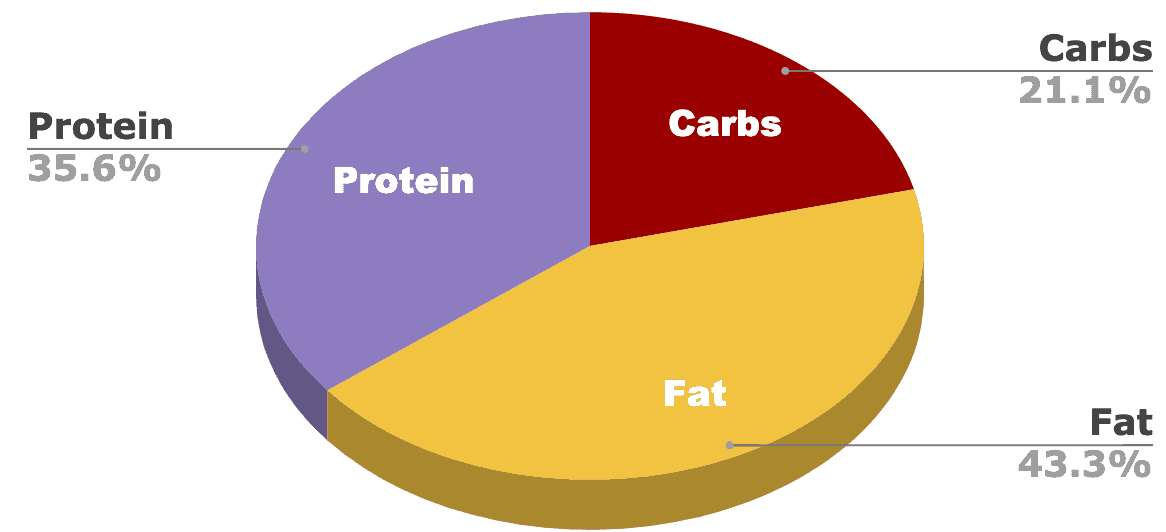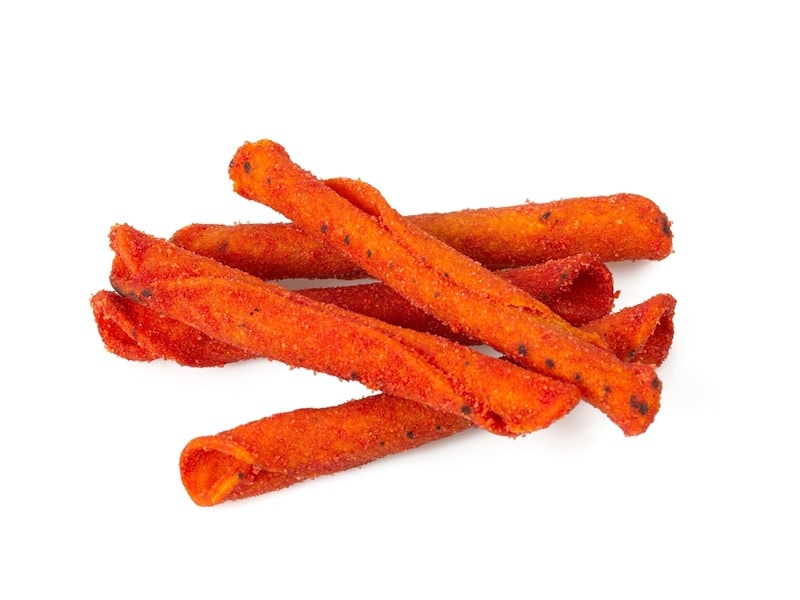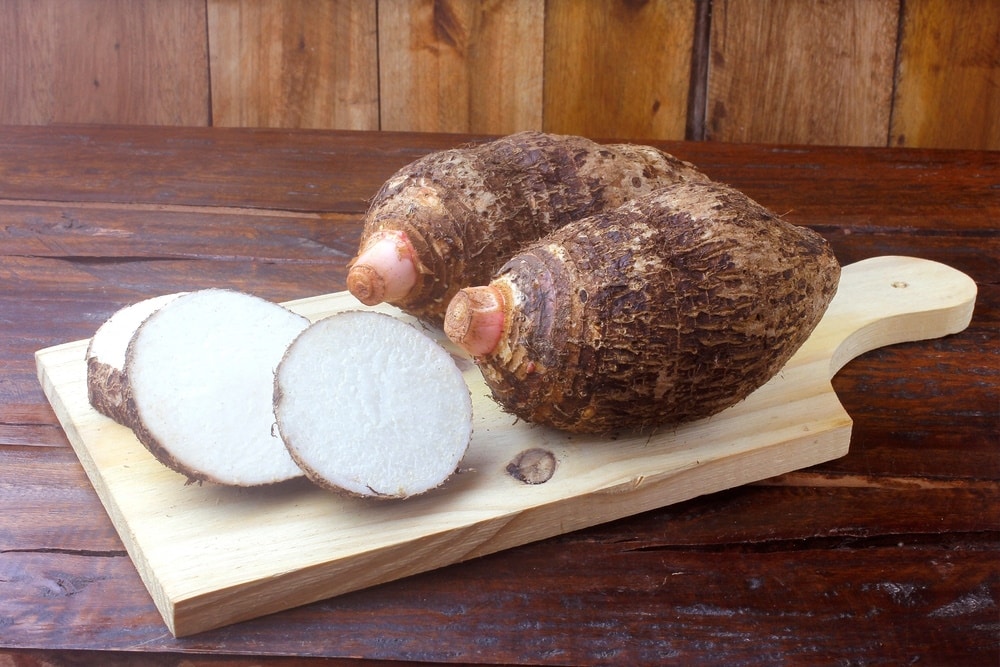Review Summary
We give Orijen Cat Food a rating of 4.8 out of 5 stars.
As you probably guessed, “Orijen” is a play on “origin”—meaning, the food harkens back to the origins of a cat’s diet. As a result, the manufacturer strives to create biologically-appropriate offerings for your cat. That means plenty of proteins and never any strange chemicals. All of the foods are made in the Orijen kitchen in Alberta. It only manufactures food for its two brands, Orijen and Acana, so you don’t have to worry about your cat’s chow sharing a kitchen with lower-quality foods.
Orijen uses only fresh regional ingredients, which aren’t in short supply, given that it’s situated in the middle of some of Canada’s most fertile farm and ranch land. All the protein sources are freeze-dried at peak season to lock in their nutrients, and it doesn’t skimp on the meat: almost all of its recipes start off with seven or eight animal sources.
All of that meat will cost you, though, as this is one of the priciest cat foods on the market. Orijen also has a limited selection, so if your cat doesn’t care for one or two of its foods, you’ll run out of options fast. Also, it only offers dry food and treats, so you’ll have to get your canned goods elsewhere.
Overall, though, this is one of the most nutritious foods that you’ll find anywhere (assuming you can find it—it’s hard to track down in most pet stores).
At a Glance: The Best Orijen Cat Food Recipes:
| Image | Product | Details | |
|---|---|---|---|
Our Favorite
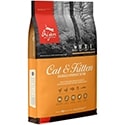
|
Orijen Dry Cat & Kitten Food |
|
CHECK PRICE |
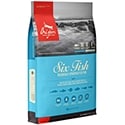
|
Orijen Six Fish Dry Cat Food |
|
CHECK PRICE |

|
Orijen Regional Red Dry Cat Food |
|
CHECK PRICE |
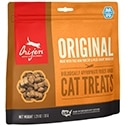
|
Orijen Freeze-Dried Cat Treats |
|
CHECK PRICE |

|
Orijen Wild-Roaming Boar Formula Cat Treats |
|
CHECK PRICE |
Orijen Cat Food Reviewed
Who Makes Orijen and Where Is It Produced?
Orijen is made by Champion Pet Foods, a manufacturer based out of Alberta, Canada. The company makes Orijen and Acana pet foods, and that’s it, so you don’t have to worry about it sharing a plant with lower-quality foods.
It doesn’t outsource any part of the manufacturing process, ensuring that every single one of its foods is entirely within its control at all times.
Which Types of Cats Is Orijen Best Suited For?
Orijen is one of the most expensive cat foods on the market, so it’s not for the price-conscious pet owner. Many feel that the food is worth every penny, but that won’t make much difference if you don’t have many pennies to spare.
It’s extremely high in protein, so it should be suitable for just about any cat. It’s probably best suited for younger cats, though, as it may be too nutrient-dense for seniors.
Which Types of Cats Might Do Better with a Different Brand?
Most cats should do well with this food; after all, it’s based on what they naturally eat. However, it’s out of many owners’ price range, so that may not matter if you’re not willing or unable to drop a bundle on cat food.
Orijen only makes dry food as well, so it’s not a good choice for cats with late-stage periodontal disease. If your cat can’t crunch hard kibble, they’ll need something else (we’d recommend Reveal Grain-Free Wet Canned Cat Food).
Discussion of the Primary Ingredients
Every single Orijen recipe starts with real meat and then follows it up with more meat and more meat after that. Most of its foods list seven or eight protein sources before you get to any other ingredients. It’s not low-quality meat either. Orijen uses premium fish, like Atlantic mackerel and herring, free-range chicken, and even exotic red meat, like boar and goat. It’s a far cry from the processed chicken that you’ll find in most cat foods, and there’s a good chance that your cat will love it as a result.
If you read far enough down the ingredients list, you’ll eventually run out of meat. Instead, you’ll see foods like peas, lentils, and beans. These aren’t nearly as important or essential as protein for a cat’s diet, so it’s appropriate to see them pushed down the ingredients list. You’ll also find ingredients like herring oil. These add plenty of omega fatty acids, which improve coat health, boost immune response, and provide essential nutrients to the brain.
There’s not much to quibble about on that list, but if we could point out one area for improvement, it’s the relatively paltry amount of fiber that many of Orijen’s foods have. If it could boost that without sacrificing any of the protein along the way, Orijen would have near-perfect cat food.
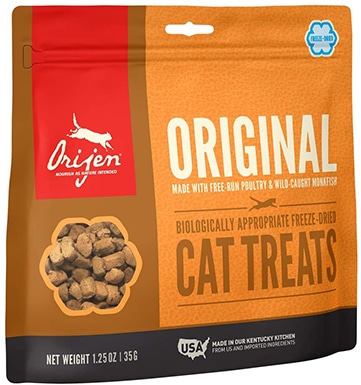
Orijen Feeds a “Whole Prey” Diet
When a cat kills a bird in the wild, they don’t just eat the breast—they devour the whole animal. There are important nutrients in the organs, the bones, and the cartilage that cats have evolved to need in their diets, but many foods omit these because of price concerns.
Orijen doesn’t do that. Its “whole prey diet” philosophy means it includes every bit of the animal that your cat would eat if they snagged it on their own. As a result, your cat gets more nutrients—including vital amino acids—than they would from many other foods.
Each of Its Foods Contains at Least Six Different Meat Sources
As a continuation of its origins-based diet plan, Orijen includes at least six different meat sources in each recipe. Wild cats don’t just eat a single food source—they eat anything they can catch, including fish, birds, mice, and more. Most commercial cat foods have only a few meat sources inside, if that, so your cat doesn’t get much nutritional variety.
That’s not the case with Orijen. Your cat will get plenty of proteins and amino acids from a variety of animals, ensuring that all their nutritional needs are met.
Orijen’s Food Is Low-Carb
Cats don’t actually need fruits or veggies to be healthy, as they’re pure carnivores. However, many high-quality plants offer important nutrients that can help your cat live a longer, healthier life.
The problem is that there’s only so much room in a piece of kibble, so the more carbs you include, the less protein you can put in. Orijen adds impressive fruits and veggies into its foods, but they’re all listed toward the bottom of the ingredients list.
The bulk of each kibble is meat—a variety of meat, at that.
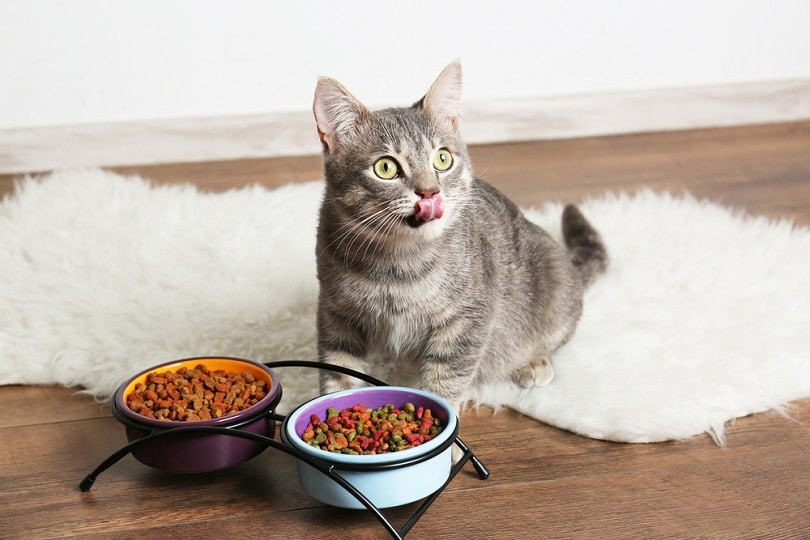
It Doesn’t Currently Offer Any Wet Foods
If you like to feed your cat canned food, you’ll need to find another brand, because Orijen only makes dry kibble at this time.
The reason that it’s stayed out of the wet food market is that most wet food is fully cooked, whereas Orijen likes to include a healthy dose of fresh and raw meat in its kibble. This is more biologically appropriate, of course, as you’ll never see cats in the wild cooking their meat over an open flame!
Feeding your cat a high-quality diet is important for keeping them healthy and happy. But it goes beyond the food you choose; the dishes they use also matter. The Hepper NomNom Cat Bowl is our favorite for its unique, five-star design that protects from whisker fatigue and promotes good posture which also aids in better digestion. As an added bonus, it’s beautifully crafted and offers a modern take on the traditional cat bowl that fits seamlessly with all home stylings. Learn more about the NomNom by clicking here. At Catster, we’ve admired Hepper for many years and decided to take a controlling ownership interest so that we could benefit from the outstanding designs of this cool cat company!
A Quick Look at Orijen Cat Food
- High in protein
- Made using biologically-appropriate principles
- Each recipe uses at least six different meat sources
- Expensive
- Can be hard to find
- No wet food available
Recall History
Orijen has only had one recall in its history, and it’s debatable as to whether it’s even at fault for it.
In 2008, Orijen cat food sold in Australia was recalled after it made several cats gravely ill and killed a few others. However, it wasn’t anything in the food that caused it—it was the fact that the Australian government required imported food to undergo mandatory irradiation treatment in order to destroy foreign microbes.
However, the radiation also depleted the vitamin A content in the food and released free radicals, the combination of which led to several cats falling ill. Orijen quickly withdrew its products from the shelves, but the resulting investigation showed that its food wasn’t at fault.
So, while Orijen has had a serious recall in its time, it’s hard to hold Orijen completely accountable for it.
Reviews of the 3 Best Orijen Cat Food Recipes
1. Orijen High-Protein, Grain-Free Dry Cat & Kitten Food
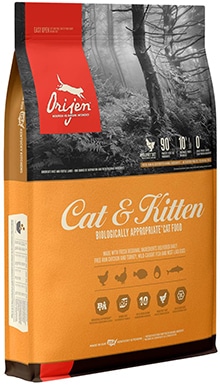
Orijen Cat & Kitten is suitable for just about every life stage, at least until your cat starts getting up there in years. As a result, you can start your cat off on it early and keep feeding it to them for years.
Its two primary types of meat are chicken and turkey, which most cats are already familiar with and tolerate well. It’s not all poultry, though, as you’ll find a variety of fish inside as well. This gives your pet plenty of omega fatty acids, not to mention a few extra helpings of extremely lean meat.
Some of our favorite ingredients are listed toward the bottom of the label, though. You’ll see things like ground chicken bones and turkey cartilage, both of which are full of important amino acids yet rarely seen in commercial cat foods. There’s not much to take issue with inside the bag, but the biggest thing is probably the inclusion of whole eggs. Some cats can be allergic to eggs, so you should monitor your kitty closely to make sure they’re handling the food well.
All in all, Orijen Cat & Kitten is a fantastic food that your cat will enjoy most of their life, making it worthy of its place as Orijen’s flagship recipe.
Calorie Breakdown:
- Turkey and chicken are well-tolerated by most cats
- Boasts a variety of fish
- Full of omega fatty acids
- Includes rare but important ingredients like ground chicken bones
- Eggs can be an allergen for some animals
2. Orijen High-Protein, Grain-Free Six Fish Dry Cat Food
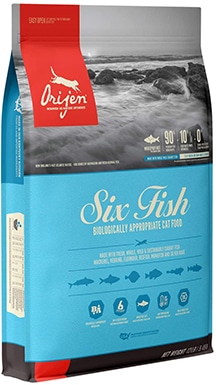
You’re probably wondering why this recipe is called “Orijen Six Fish,” but as it turns out, there are six different fish inside this recipe. Those aren’t generic bottom-feeder fish either. They are premium species like Atlantic mackerel, Acadian redfish, and silver hake. All of these fish are positively brimming with omega fatty acids, and most cats love the taste.
Be forewarned, though, that you’ll smell the fish as soon as you open the bag. That may mean you’ll have to hide it from your cat, but you’ll also want to hold your nose at dinnertime. There’s no other meat but fish inside, though, which wouldn’t be a criticism for any other food. However, when compared to some of Orijen’s other offerings, it seems a little lacking
The fruits and veggies are nothing but quality, though. This is a grain-free recipe, and instead of cheap fillers like corn or soy, it uses pumpkin seeds, carrots, apples, pears, and more. If you have a cat that can’t resist fish, Orijen Six Fish is likely to be their new favorite food.
Calorie Breakdown:
- Uses six different fish as protein sources
- Only includes high-quality species
- Loaded with omega fatty acids
- High-quality fruits and veggies
- Strong fish odor
- No other meat sources besides fish
3. Orijen High-Protein, Grain-Free Regional Red Dry Cat Food

Orijen Regional Red offers yet another potential meat source for your cat to munch on, in this case, a variety of red meats. The first ingredient is beef, but after that, you’ll find exotic animals like boar, goat, bison, and lamb. Orijen uses every part of those animals too, as you’ll find a variety of internal organs on the ingredients list. This gives your pet all the essential amino acids that they need from the animals on the label. It’s not all red meat, though. There’s also freeze-dried cod liver coating the kibble, which will encourage your cat to wolf it down.
You should keep in mind that many cats don’t eat much red meat, so your tabby may be more likely to pass this food up than the others above. The cod liver coating helps, but finicky eaters may still give it the cold shoulder. Also, since it doesn’t have much in the way of fish, you’ll find fewer omega fatty acids in this than in the other recipes. It shouldn’t be too massive of a disparity, though.
If you want to give your cat something other than the same-old same-old, Orijen Regional Red is a nutritious curveball that they might just decide that they love.
Calorie Breakdown:
- Includes a variety of exotic red meats
- Full of important internal organs
- Coated in freeze-dried cod liver
- Nice change of pace from fish and chicken recipes
- Some cats may not like the taste
- Fewer omega fatty acids than other recipes
What Other Users Are Saying
- All About Cats — “Orijen foods rely heavily on fresh meat and botanicals to achieve nutritional completeness and don’t contain the array of synthetic vitamins, minerals, and amino acids found in most cat foods.”
- Cat Food Database — “Overall, Orijen Cat & Kitten is a significantly above-average cat food.”
- Amazon — As pet owners, we always double-check Amazon reviews from buyers before we buy something. You can read these by clicking here.
Conclusion
You won’t find many cat foods on the market like Orijen. Its recipes are absolutely jam-packed with meat and a wide variety of it too. Your cat will think that they’re being served an animal buffet every single night. Of course, it’s not without its flaws. It’s one of the more expensive foods you’ll find, and since the company doesn’t make wet foods, it may not be ideal for older cats or those with advanced periodontal disease.
For everyone else, though, Orijen is an excellent choice that will help your feline grow strong and healthy. If you can afford it, you’ll be hard-pressed to find a better option.
Next on your reading list:
- 7 Best Cat Foods for Cats with Allergies – Reviews & Top Picks
- 9 Best Wet Cat Foods: Canned, Soft, & Pâté Reviews
Featured Image Credit: Chewy
Contents
- Review Summary
- At a Glance: The Best Orijen Cat Food Recipes:
- Orijen Cat Food Reviewed
- Who Makes Orijen and Where Is It Produced?
- Which Types of Cats Is Orijen Best Suited For?
- Which Types of Cats Might Do Better with a Different Brand?
- Discussion of the Primary Ingredients
- Orijen Feeds a “Whole Prey” Diet
- Each of Its Foods Contains at Least Six Different Meat Sources
- Orijen’s Food Is Low-Carb
- It Doesn’t Currently Offer Any Wet Foods
- A Quick Look at Orijen Cat Food
- Recall History
- Reviews of the 3 Best Orijen Cat Food Recipes
- 1. Orijen High-Protein, Grain-Free Dry Cat & Kitten Food
- Calorie Breakdown:
- 2. Orijen High-Protein, Grain-Free Six Fish Dry Cat Food
- Calorie Breakdown:
- 3. Orijen High-Protein, Grain-Free Regional Red Dry Cat Food
- Calorie Breakdown:
- What Other Users Are Saying
- Conclusion











